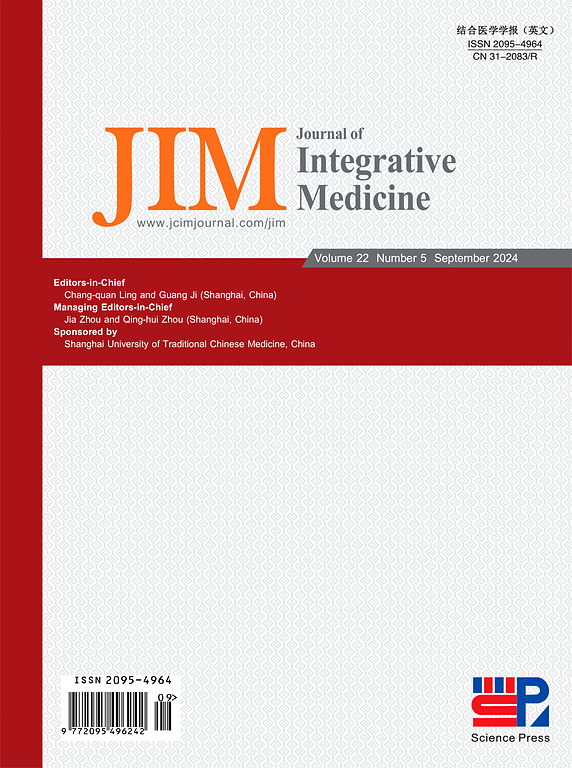肉桂治疗代谢综合征的潜力:来自体内和人体研究的见解。
IF 4
2区 医学
Q1 INTEGRATIVE & COMPLEMENTARY MEDICINE
引用次数: 0
摘要
代谢综合征(MetS)是一组显著增加患心脏病、2型糖尿病、中风和其他心血管并发症几率的危险因素。由于目前的抗代谢代谢药物,如他汀类药物、血管紧张素转换酶抑制剂、β受体阻滞剂、胰岛素增敏剂和利尿剂,据报道会引起不必要的副作用,研究人员正在探索有希望的替代品。其中一种替代方案依赖于香料和调味品的潜力,它们在传统医学中有着悠久的使用历史。其中,肉桂(Cinnamomum zeylanicum Blume)以其独特的口感、香气和细腻的甜味,与其他肉桂品种相比,成为全球流行的香料。本文综述了zeylanicum对MetS指标的体内和临床疗效。检索PubMed、Scopus和谷歌学者数据库的相关文章。体内实验结果表明,莪术制剂(提取物、精油、粗粉、生物活性化合物和生物合成纳米颗粒)对改善MetS指数有显著的效果,但临床数据较少,并且存在一些方法学上的局限性。进一步强有力的临床研究有必要明确地确定C. zeylanicum作为一种有前景的功能食品,以减轻MetS,可能导致其饮食整合作为一种自然的方法来改善代谢健康。这篇文章请注明出处:Adarthaiya S, Arivarasan VK。肉桂治疗代谢综合征的潜力:来自体内和人体研究的见解。集成医学[J];打印前Epub。本文章由计算机程序翻译,如有差异,请以英文原文为准。
Potential of Cinnamomum zeylanicum for metabolic syndrome management: insights from in vivo and human studies
Metabolic syndrome (MetS) is a cluster of risk factors that significantly increase the chances of developing heart disease, type 2 diabetes mellitus, stroke, and other cardiovascular complications. Since current anti-MetS medications like statins, angiotensin-converting enzyme inhibitors, β-blockers, insulin sensitizers and diuretics have been reported to cause unwanted side effects, researchers are exploring promising alternatives. One such alternative relies on the potential of spices and condiments, which have a long history of use in traditional medicine. Among them, Cinnamomum zeylanicum Blume stands out as a popular spice worldwide for its unique taste, aroma, and delicate sweetness compared to other cinnamon varieties. This narrative review aims to summarize the in vivo and clinical evidence concerning the efficacy of C. zeylanicum against MetS indices. Relevant articles from PubMed, Scopus and Google scholar databases were reviewed. In vivo results suggested that C. zeylanicum preparations (extracts, essential oil, crude powder, bioactive compounds, and biosynthesized nanoparticles) were remarkably efficient in ameliorating MetS indices, while the clinical data were less and with several methodological limitations. Further robust clinical studies are warranted to definitively establish C. zeylanicum as a promising functional food for mitigating MetS, potentially leading to its dietary integration as a natural approach to improve metabolic health.
Please cite this article as: Adarthaiya S, Arivarasan VK. Potential of Cinnamomum zeylanicum for metabolic syndrome management: insights from in vivo and human studies. J Integr Med. 2025; 23(3): 218–229.
求助全文
通过发布文献求助,成功后即可免费获取论文全文。
去求助
来源期刊

Journal of Integrative Medicine-Jim
Medicine-Complementary and Alternative Medicine
CiteScore
9.20
自引率
4.20%
发文量
3319
期刊介绍:
The predecessor of JIM is the Journal of Chinese Integrative Medicine (Zhong Xi Yi Jie He Xue Bao). With this new, English-language publication, we are committed to make JIM an international platform for publishing high-quality papers on complementary and alternative medicine (CAM) and an open forum in which the different professions and international scholarly communities can exchange views, share research and their clinical experience, discuss CAM education, and confer about issues and problems in our various disciplines and in CAM as a whole in order to promote integrative medicine.
JIM is indexed/abstracted in: MEDLINE/PubMed, ScienceDirect, Emerging Sources Citation Index (ESCI), Scopus, Embase, Chemical Abstracts (CA), CAB Abstracts, EBSCO, WPRIM, JST China, Chinese Science Citation Database (CSCD), and China National Knowledge Infrastructure (CNKI).
JIM Editorial Office uses ThomsonReuters ScholarOne Manuscripts as submitting and review system (submission link: http://mc03.manuscriptcentral.com/jcim-en).
JIM is published bimonthly. Manuscripts submitted to JIM should be written in English. Article types include but are not limited to randomized controlled and pragmatic trials, translational and patient-centered effectiveness outcome studies, case series and reports, clinical trial protocols, preclinical and basic science studies, systematic reviews and meta-analyses, papers on methodology and CAM history or education, conference proceedings, editorials, commentaries, short communications, book reviews, and letters to the editor.
Our purpose is to publish a prestigious international journal for studies in integrative medicine. To achieve this aim, we seek to publish high-quality papers on any aspects of integrative medicine, such as acupuncture and traditional Chinese medicine, Ayurveda medicine, herbal medicine, homeopathy, nutrition, chiropractic, mind-body medicine, taichi, qigong, meditation, and any other modalities of CAM; our commitment to international scope ensures that research and progress from all regions of the world are widely covered. These ensure that articles published in JIM have the maximum exposure to the international scholarly community.
JIM can help its authors let their papers reach the widest possible range of readers, and let all those who share an interest in their research field be concerned with their study.
 求助内容:
求助内容: 应助结果提醒方式:
应助结果提醒方式:


